So we have an advantage mainstream media does not. When something is really interesting, or really bad, we have people who will provide the necessary context. It's safe for us to throw up a rewritten press release about a miracle vegetable or play Devil's Advocate on woo because we're not a newspaper written for 14-year-olds.
That doesn't mean press releases are not dirty business. They are competitive and generate a lot of money for the companies publishing them. They can also sometimes be used to pump up excitement for rather middling, incremental 'studies'. Professor Michael Eisen, investigator for the Howard Hughes Medical Institute and evolutionary biologist at UC Berkeley, takes the media slightly to task for buying into aggressive press release coverage but we have to give the New York Times a break - churnalism is what most of them do, just like in most other mainstream outlets (and even, errrr, us, though doing it for free as a service to science readers is arguably different than being a paid journalist) and reading the press release about genomic fortune-telling and what it can't do is snazzy. But who didn't know that? The only people claiming a lack of certain genes linked to certain diseases or even cancer provides a for a consequence-free life are people selling genetic testing.
To wit:
“In families with strong histories of cancer, whole genome sequencing can still be very informative for identifying inherited genes that increase cancer risk,” said Victor Velculescu, M.D., Ph.D., professor of oncology. “But hereditary cancers are rare. Most cancers arise from mutations acquired through environmental exposures, lifestyle choices and random mistakes in genes that occur when cells divide.”
Yet most people who get cancer think cancer 'runs in their family'. It's nice to think that because then diseases are both egalitarian and exculpatory. If you get it, it isn't because you did anything wrong. Random mutations could obviously be the fallback also but no one could sell any genetic testing services then and its hardly world-shaking stuff to have that debunked. What really gets Eisen going is that the researchers seem intent on publicizing the possible benefits of their research effectively (and who can blame them?) but the people most likely to increase the citations and value of the research itself can't actually read it. Eisen is at one of the largest research universities in the world and couldn't read the study. He would have to have paid $15 to read Science Translational Medicine, of all things. Why would researchers be okay with blocking it off to the public when they clearly want to promote it? More importantly, he scolds the publisher of the journal, AAAS, for claiming to care about "engaging the public" but then not actually doing so when they can make a buck formatting an article they did not write, about research they did not do, that was funded by someone else - and getting to charge a hundred bucks a year for it.
Eisen is co-founder of American open access publisher Public Library of Science so clearly he is no cynical opportunist whining on the Internet and wanting something for nothing, he put his time into building what he feels is a better way. He believes this stuff and he lives for engagement in a way large corporations only talk about. He wants the mold broken, basically, which is very Science 2.0. We did a panel together(1) at an AAAS conference in 2009 and his first slide was this:

At least he didn't single any of them out. Credit: not sure, he said it was something he and his brother did.
Who didn't laugh that he was at an AAAS conference talking about how the future of research was going to be better without them? Probably them. I certainly have not been invited back to talk.
If press releases are all the public gets (and, to be fair, many of them are quite good) then dumping NSF money into outreach campaigns seems a little silly. It isn't improving science literacy and we don't need to pretend it is all that vital when the government is redistributing money for research and doesn't put a stop to keeping articles out of the hands of taxpayers and keeps on making science a de facto subsidy for publishing conglomerates.
Despite his dislike for federally funded research not being available for free to all taxpayers who are funding it, he was kind enough to link to the journal article and increase its Internet authority. I suppose if he can be gracious, so can I:
Nicholas J. Roberts, Joshua T. Vogelstein, Giovanni Parmigiani, Kenneth W. Kinzler, Bert Vogelstein, and Victor E. Velculescu, “The Predictive Capacity of Personal Genome Sequencing”, Sci. Transl. Med. DOI: 10.1126/scitranslmed.3003380
NOTES:
(1) An open community gets some cranks that fly in under the radar.
(2) And we sponsored an afterparty with drinks named after the participants - and you needed a golden ticket to get in. It was all very Willy Wonka:




Comments